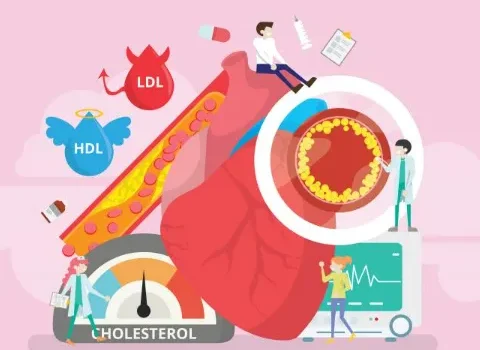When you’re young, taking care of your health may not always include worrying about cholesterol. However, skipping cholesterol screenings in your 20s and 30s could put your health at risk in the future. Here’s why it’s important to start monitoring your cholesterol levels early.
Establish Your Baseline
Getting your first cholesterol screening in your 20s or 30s helps establish a baseline for your cholesterol levels. By knowing what your cholesterol numbers are at a young age, you and your healthcare provider can keep track of any changes over time. This early screening provides insight into your total cholesterol, LDL (“bad” cholesterol), HDL (“good” cholesterol), and triglycerides. As you age, regular checkups can show any concerning changes, such as rising LDL levels or shifts in the ratio of good to bad cholesterol, which may require adjustments in lifestyle or even medication.
Understand Your Family History
High cholesterol can run in families. If your parents had high cholesterol, there’s a higher chance that you might too. Familial hypercholesterolemia (FH) is a genetic condition that causes extremely high levels of cholesterol, increasing the risk of heart disease and strokes. By knowing your cholesterol levels early, you can pinpoint whether you might be at risk due to family history. Early detection of FH or genetic tendencies toward high cholesterol can lead to better management strategies, reducing the risk of heart complications down the line.
Uncover Hidden Health Risks
High cholesterol is often referred to as a “silent” condition because it doesn’t usually present noticeable symptoms. You may feel perfectly fine while your cholesterol levels are high enough to cause plaque buildup in your arteries, which can eventually lead to heart disease. Early cholesterol screenings help detect these hidden risks before more severe issues like chest pain, heart attacks, or strokes occur. Identifying and addressing these concerns early can prevent long-term damage to your cardiovascular system.
Create a Personalized Prevention Plan
Everyone’s cholesterol levels and risk factors are different, so it’s essential to create a personalized prevention plan. Early screenings provide valuable data that helps your doctor tailor a strategy to control your cholesterol levels based on your age, health status, and lifestyle. This plan may include dietary changes to lower cholesterol, regular exercise, weight management, and monitoring for other conditions like diabetes. Follow-up screenings will assess how well the plan is working and determine if adjustments are needed.
Maximize the Benefits of Lifestyle Changes
Adopting healthy habits early can make a significant difference in cholesterol management. Starting lifestyle changes, such as incorporating regular exercise and eating a heart-healthy diet, in your 20s and 30s can offer long-term benefits. For example, switching from butter to olive oil or committing to regular cardio can help manage your cholesterol and prevent future issues. These changes can have a more lasting and positive impact when implemented early, giving you a solid foundation for heart health in the future.
Consider Your Unique Risk Factors
Certain groups, such as South Asians and Hispanics, may develop cholesterol-related health risks earlier than other populations. Additionally, FH can affect individuals across all ethnic backgrounds. Being aware of your specific risks through early screenings enables you to take proactive steps in managing your heart health. In some cases, medication such as statins may be recommended to help reduce cholesterol and prevent long-term damage.
Peace of Mind
Knowing your cholesterol levels can relieve anxiety and provide peace of mind. Whether your cholesterol numbers are healthy or need attention, understanding your results empowers you to make informed decisions about your health. Regular screenings allow you to take control and make necessary changes to improve your cholesterol, ensuring better long-term cardiovascular health.
Should Younger Adults Consider Statins?
If you have high cholesterol, your doctor may recommend statins to help lower your LDL levels. Statins are particularly effective in reducing cholesterol and lowering the risk of heart disease. Here are some factors to consider:
- Statins can provide long-term protection, especially if lifestyle changes alone aren’t enough to manage cholesterol.
- Research shows that lowering LDL cholesterol earlier in life can reduce long-term cardiovascular risks.
- Most young adults tolerate statins well, and side effects are generally rare and manageable.
- Affordable generic statins are available, making them accessible to younger adults.
In cases of severely high cholesterol or multiple risk factors, statins may be a reasonable option. Always consult with your doctor to weigh the benefits and risks specific to your situation.
By starting cholesterol screenings early, younger adults can take proactive steps to maintain heart health and reduce the risks of cardiovascular disease later in life.











